- Home
- Donald Hamilton
The Terrorizers Page 2
The Terrorizers Read online
Page 2
The telephone rang. It startled me; then I decided it had to be Kitty calling to straighten things out between us. I sighed and picked up the instrument.
A man’s voice spoke in my ear: “Helm?”
The voice meant nothing to me, and neither did the name. “What’s a Helm?” I asked.
“You are,” said the voice, and the phone went dead.
2
I replaced the instrument slowly. Then I sat there for a while, trying to put my small, safe, comfortable world back together. It had been a peaceful hospital existence with nothing to worry about except getting well. Okay, so I had a spot of amnesia; I could live with it. Sooner or later the past would return. Even if it didn’t, well, nobody dies from loss of memory. What I’d misplaced probably wasn’t priceless judging by what had emerged to date: some free-lance photography in the far-off boonies, a bit of non-combatant war experience—well, maybe my history was a little more colorful than some, but it still wasn’t anything I couldn’t afford to forget.
What had mattered was that I was alive, I was being well looked after, I had a lovely fiancee willing to share my problems, and I had a home and business waiting for me down in the U.S. Some officials had asked me some searching questions, to be sure, but that had been just part of the normal post-airplane-crash routine. I was a fairly ordinary guy named Madden who’d had a narrow escape from death and whose job was simply to regain his strength and pick up his life where he’d left it.
That was the way it had been. Now it was gone, wiped out by a kiss and a phone call. My lovely fiancee was a sweet little fraud. My name wasn’t Madden…
I drew a long breath and told myself to relax. Maybe I was taking the whole thing too seriously. I was, after all, not exactly a picture of perfect health at the moment—either physical or mental health. I could be building a couple of minor incidents into a major crisis simply because my recent harrowing experiences had left me vulnerable. Maybe Kitty Davidson was, as she’d claimed, just a fastidious young lady who couldn’t bring herself to risk the embarrassment of being caught wrestling happily and sexily with a man, even a man she was going to marry, on a rumpled hospital bed behind an unlocked door. Maybe. And maybe the phone call had been a hoax or a joke perpetrated by a crank or a prankster—but up here in remote Prince Rupert, B.C., who’d bother?
Instinct warned me that it was serious and that I’d damned well better take it seriously. I might be reading too much into Kitty’s reaction, but nobody would call up a hospital patient with a grave psychological problem and toss a strange name at him just for fun. Helm. It still didn’t mean anything to me. The steering control of a boat. An old-time military skull-protection device. A patronym of Nordic or German origin.
Helm. If I was Helm, as the voice had indicated, who was Madden, if there was a Madden?
But there had to be a Madden. With the probable death of the pilot to investigate, with the sole survivor of the crash claiming ignorance on the grounds of amnesia—amnesia, for God’s sake, the refuge of every impulse murderer whose mind suddenly went blank, your Honor, totally blank—the Canadian authorities would inevitably have checked me out at least as far back as the house at 2707 Brightwood Way, Bellevue, Washington. I’d be very much surprised if they hadn’t checked a lot farther. There simply had to be a Madden living at that address who took pictures for a living and had a convincing background, or the questioning to which I’d been subjected would have been a lot longer and tougher.
I remembered the blocky, dark gent in plainclothes from the Royal Canadian Mounted Police. He’d been doing a lot of heavy thinking behind his deadpan expression. Even with Kitty making a positive identification, he would have found any obvious discrepancies in my record if there had been some to find. So Madden must exist—or must he? After all, I’d been told that he’d only made his appearance in the Seattle area some six months ago.
Was there, perhaps, just a guy named Helm who’d rented a house, set up a darkroom, and handed out business cards with a name that wasn’t his? If so, why? And if so, why was Miss Catherine Davidson supporting the masquerade with outrageous hints about our beautiful sex life together, when she was actually, it seemed, a fairly inhibited kid who recoiled in near panic from a man’s hand on her fanny, not to mention on the zipper tab of her stylish slacks?
Helm, I thought. A mysterious character named Helm, pretending to be a free-lance photographer named Madden. A detective tracking down a criminal or a criminal organization? A spy or counterspy? A robber or con man setting up a big caper? In any case, it seemed that this nebulous, weirdo had taken a hired plane north into the Canadian bush and wound up floating in the ocean a long way from his supposed destination minus his aircraft, his pilot, and his memory. An attractive female had then appeared, very conveniently, to claim this masquerader as her lover and intended husband, and confirm his false identity… Nuts! It was TV stuff, I told myself irritably. I was building a melodramatic soap opera out of a word spoken on the phone and the fact that a nice girl had behaved in a sensible and ladylike manner instead of succumbing wantonly to my crude advances.
My head had begun to ache. I reached for the newspaper on the bed and forced myself to shove the wild speculations out of my mind. The attending psychiatrist had said I shouldn’t allow myself to get disturbed or excited, ha! I told myself that the news, as funneled through the Vancouver press, deserved my most careful attention. Reading resolutely, I learned that people were passing, or hoping to pass, or hoping to keep from passing, laws against cigarettes, dogs, guns, old age, and automobile accidents, to mention only a few of the subjects being considered for legislative remedies. The French-speaking citizens of Canada were demanding their linguistic rights, whatever those might be. The commercial fishermen were demanding protection against the depredations of foreign fishermen. The Canadian political parties were still calling each other names. So much for the overall picture.
On the local level, the recent heavy rains—I was glad to see somebody around the place admitting it had actually been raining kind of hard—had flooded certain roads in the Vancouver area and washed out most of a small town over on Vancouver Island. Don’t get confused: that Captain Vancouver covered a lot of territory. The city of Vancouver is one thing: a metropolis of close to half a million inhabitants situated on the mainland. Vancouver Island is something else again: a rugged, offshore piece of real estate almost three hundred miles long. The capital of the province, Victoria, is out on this island. The two cities are connected by a system of ferries, one of which had just been bombed, providing the big news of the day:
FERRY EXPLOSION KILLS THREE
Reformo Leader Among Victims of Terrorist Bomb
Grateful for something interesting enough to take my mind off my own troubles, I read the story carefully. Apparently, the explosives had been left in an old Ford van on the car deck, and timed to go off just as the ferry, having made its fifty-mile crossing of the Strait of Georgia, was docking at Tsawwassen—don’t ask me how to pronounce it—at the mainland end of the run. Fortunately, in loading, the van had got parked at the end of the vessel instead of in the more crowded and vulnerable middle. Fortunately, also, there had been some fog to delay the crossing; the explosion had therefore occurred while most passengers were still on the upper decks, instead of as they were returning to their cars, near the bomb, in preparation for landing. Even so, a dozen people had been injured and three of these had died, including a well-known Canadian politician of whom I’d never heard, who’d stayed in his car to work on a campaign speech to be delivered in Vancouver. His name had been Andrew McNair, and he’d been the head of the Reform Movement, whatever that might be, known in Canadian political shorthand as Reformo.
Quick work by the ferry’s crew had contained the fires that had been started on the car deck. The captain had managed to dock the damaged vessel and disembark the passengers in orderly fashion. However, the continuing threat of fire, and the possibility of exploding gas tanks, had made it imperat
ive to get everyone ashore immediately, without waiting for the police. In the confusion some people had got away from the landing area before it could be blocked off—among them, apparently, whoever had driven the van aboard, presumably in a car driven by confederates.
There was a description of the damage, as far as it had been determined at press time. The idea that the bomb could have been planted by enemies of McNair, apparently a somewhat controversial figure, was rejected on the grounds that the police had discovered in one of the restrooms, aerosol-sprayed on the wall of a booth, a known terrorist symbol, the letters PPP. The newspaper didn’t mention whether the plumbing facilities involved were designed for masculine or feminine patronage. It did state, however, that the same initials had been found in a restroom after the San Francisco bus station blast last year that had taken seven lives. What they stood for was still not known, or if it was, nobody was saying. The reporter finished his piece with a summary of all recent bombings of presumably terrorist origin: the La Guardia airport explosion, the Toronto railroad bang, and several others. He didn’t say that the unknown PPP organization was responsible for all of them, but he didn’t say it wasn’t…
Somebody knocked on the door of my room. Nurses and other hospital functionaries either don’t knock at all or knock and walk right in. I waited, but nobody appeared. The knock came again. I drew a long breath. It was probably either the Mounties or the Ministry of Transport. I wondered a bit uneasily what the hell they wanted now.
“Come in,” I called, and the door opened.
The girl who entered looked much too small to be a Mountie, and she didn’t resemble any investigator I’d encountered to date. I told myself I’d never seen her before in my life.
“Hello, Paul,” she said.
Obviously I’d told myself wrong.
3
She came forward rather hesitantly. She was small and slender, with heavy black hair cut short about her face, which was delicately pretty in an Oriental way. You had to hand it to Mr. Madden I reflected. Whether or not he really existed, he certainly knew how to pick them, even if his tastes did run to girls so slim they hardly cast shadows. Or maybe the choices had been Helm’s, whoever he might be.
The girl was wearing a very neat, very tailored, very occidental tweed suit with a skirt, not pants. The rare, precious sight of a pair of nice girl-legs in nylons was almost too much for me to bear in my weakened condition. She wore little plastic boots to protect her high-heeled shoes from the rain, and carried a big purse and a red raincoat.
It was time for me to say something. “Hi,” I said.
She stopped by the bed and looked at the paper I still held. “Isn’t it terrible?” she said. “That ferry, I mean. I read about it on the plane coming up from Vancouver; one of the boys had a delivery to make near here.”
“Terrible,” I agreed.
My visitor looked down at me for a moment. “I don’t mean to intrude, Paul,” she said. “You once made your feelings about clinging females quite clear, and I’m most certainly not trying to… Well, never mind that. But I just couldn’t bear to think you might be lying up here wondering if I… if we… if anybody at North-Air was blaming you for what happened to Herb.” She stopped. I didn’t say anything. She went on quickly, speaking with just the slightest hint of a Chinese accent, “We don’t, of course. To blame you for hiring him to fly would be ridiculous; flying was his business. In fact, it was very nice, very fair of you to continue to come to us when you needed a plane in spite of… in spite of everything. It certainly wasn’t your fault that it turned out this way. After all, you don’t know anything about flying; and whatever happened I’m sure you couldn’t possibly have prevented… They say you don’t really remember what happened. That’s often the case in a bad crash, I understand. I just didn’t like to think you might be, well, delaying your recovery by brooding about it. Even if we’re no longer… even if we’re not on very good terms, Paul, the least I can do is to be fair, too.”
“Sure,” I said. “Fair.”
She studied me for a moment longer. “Well, that’s all I came to say, I’d better get back to the plane before they fly off and leave me,” she went on. “I… I miss Herb very much, of course, but I’m glad you came out of it all right, I really am. I hope you get well soon.” She started to turn away.
“Wait,” I said.
She paused and glanced back over her shoulder in a reluctant way. “Please. Everything we had to say to each other, we said several months ago. I was just doing my duty as a Girl Scout. Don’t make me regret—”
“What’s your name?” I asked.
She stood perfectly still for a long time. In the silence, I could hear the inevitable rain beating against the window, and the sound of somebody rolling some kind of a cart down the hospital corridor outside. Slowly, she turned to face me again.
“Are you serious?” she asked.
I said, “They told me that I’m Paul Madden, and that I’m engaged to be married to a wonderful girl named Catherine Davidson. They didn’t tell me anything about you.”
She said without expression, “That’s hardly surprising, if your fiancee was doing the telling.” When I didn’t speak, the Chinese girl went on, “I heard from the MOT inspectors that you couldn’t remember much about the crash, but they didn’t say… I didn’t dream…”
When she stopped without finishing the sentence, I said deliberately, “As you’ll notice, I remember my English real good. I even recall some Spanish words, and there are a couple of other languages with which I seem to be slightly acquainted. I remember what happens when you add, or multiply, two and two. I can tell you about the American Revolution and the Civil War—otherwise known as the War Between the States—and a couple of World Wars and some unpleasantness in Korea. I even seem to know, in a general way, that there was a more recent conflict in Vietnam, but although I’m supposed to have attended the party with a camera, I remember nothing about that. I can tell you a bit about what New York looks like, or Seattle, or Vancouver, B.C., but I just don’t see myself in those pictures either, if you know what I mean. I don’t know when I was there if I was there, or what I did there, or whom I met there. Okay?”
She said softly, “You might have stopped me before I made a goddamned little fool of myself!”
It seemed, somehow, like a shocking thing for a Chinese girl to say, but I couldn’t have told you exactly why.
“I had to let you talk,” I said. “I’m sorry, but you might have said something that would trigger total recall.”
“Did I?”
I shook my head. “No recall at all. Back to Square One.” After a moment, I went on slowly: “I can use all the information I can get. It doesn’t have to make me out a nice guy.”
She frowned, staring at me hard, trying to decide whether or not I was kidding her. Well, that was something I was getting hardened to. Amnesia seemed to bring out the cynic in a lot of people.
“All right,” she breathed at last. “Maybe it’s a game, but all right, Paul, I’ll play it with you.” She paused to organize things in her mind, and began to speak in clipped, businesslike sentences. “My name is Sally Wong. I work for North-Air. I’m the girl behind the counter in the ticket office. We met about six months ago, right after you’d moved to Seattle, I believe. You’d driven up here to take some pictures at a local bird sanctuary. Afterwards you hired a plane from us to take you to a lake up north where you camped for several days photographing some rare ducks or something. We picked you up on schedule. You seemed to like your pilot, Herb Walters. After that, you did all your flying with us. At the time, Herb and I… well, he was in love with me and I couldn’t make up my mind. Then you and I began to…” She stopped, and made a small, helpless gesture. “You can fill in the blanks for yourself, can’t you? It was… very nice for a while. Finally you met another girl on a job you were doing for a magazine. Maybe I’d started taking things a bit too seriously for you. Anyway, it was not a very good scene as the kids
say nowadays. Luckily for me, there was big, strong, loyal Herb waiting patiently for me to come to my silly senses…” She shrugged her small shoulders inside the neat tweed jacket. “That’s it, Mr. Amnesia. I hope it helps. We Wongs are known for our fine humanitarian impulses.”
She turned sharply and hurried to the door.
“Miss Wong.” Since I didn’t remember her at all, I didn’t feel entitled to call her Sally, no matter how well we’d known each other once.
“Yes?” she said, pausing with her hand on the knob.
“Thanks.”
She threw a quick look my way. I was disturbed to see that her eyes were wet. She opened the door and was gone. After a while I got out of bed. My legs were still moderately feeble, but they didn’t collapse under my weight; after all, I’d been making the brave journey to the john for several days. I stood in front of the dresser and took stock, seeing a tall, skinny character in wrinkled pajamas with a neat white bandage on his head. The guy, Madden or Helm or whoever the hell he might be didn’t look like much of a lady-killer, but I guess you never can tell.
That night I dreamed about my boyhood. Awakening in the dark, with the hospital silent around me, I realized it hadn’t been a dream at all. At least I didn’t think it had, although the images started receding and disintegrating when I tried to call them back and study them for details. Still trying, I went back to sleep.
Before visiting hours the following morning we went through the usual hospital routine. The physical doctor, an older man named DeLong, took off the head bandage and replaced it with a slightly oversized bandaid. He told me all vital signs were positive and as far as he was concerned I was just loafing around taking up valuable space needed by sick people. Then the mental doctor had his turn. He was a young, intense, somber specimen with a big aquiline nose in a thin, dark face; the introspective kind of mind specialist who’d probably got interested in the way other people’s minds worked while worrying about the workings of his own. His name was Dr. Lilienthal. We hadn’t got chummy enough to proceed beyond that.

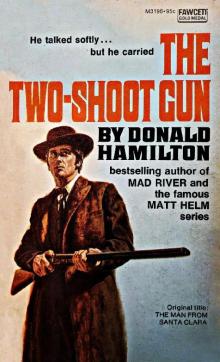 The Two-Shoot Gun
The Two-Shoot Gun Mad River
Mad River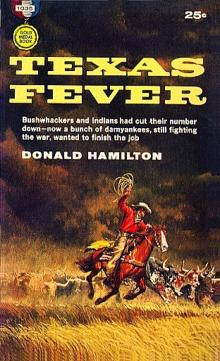 Texas Fever
Texas Fever Ambush at Blanco Canyon
Ambush at Blanco Canyon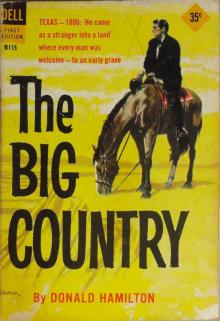 The Big Country
The Big Country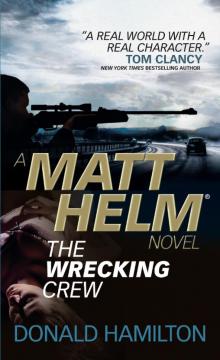 The Wrecking Crew
The Wrecking Crew The Devastators mh-9
The Devastators mh-9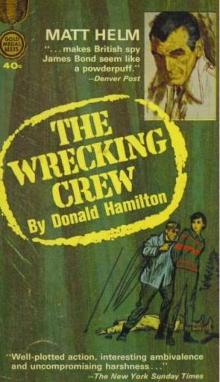 The Wrecking Crew mh-2
The Wrecking Crew mh-2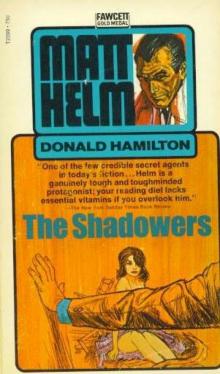 The Shadowers mh-7
The Shadowers mh-7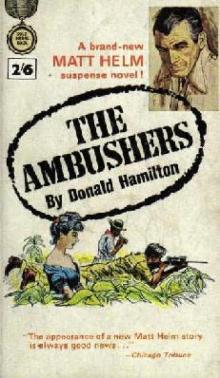 The Ambushers mh-6
The Ambushers mh-6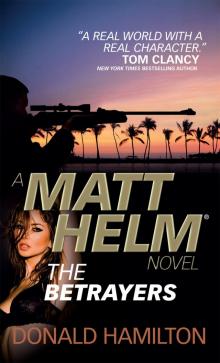 The Betrayers
The Betrayers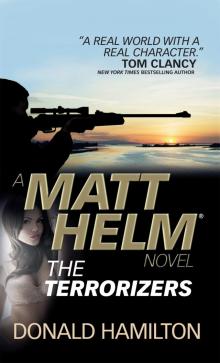 The Terrorizers
The Terrorizers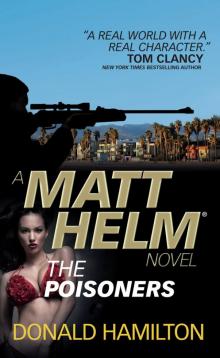 The Poisoners
The Poisoners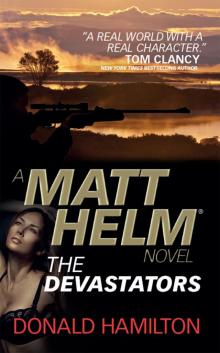 The Devastators
The Devastators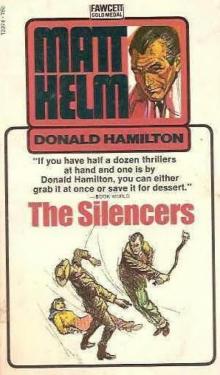 The Silencers mh-5
The Silencers mh-5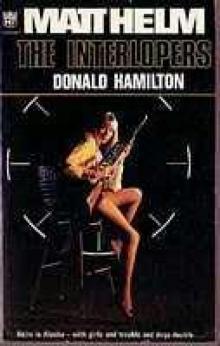 The Interlopers mh-12
The Interlopers mh-12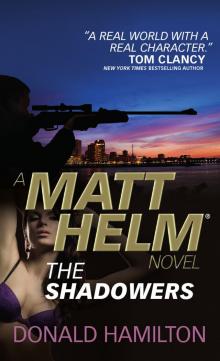 The Shadowers
The Shadowers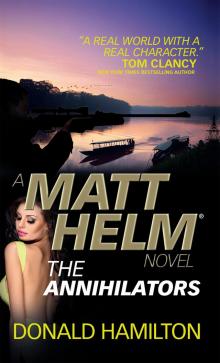 The Annihilators
The Annihilators The Vanishers
The Vanishers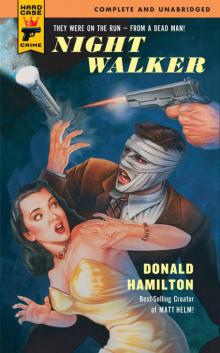 Night Walker
Night Walker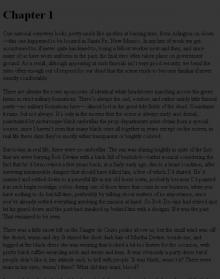 The Revengers
The Revengers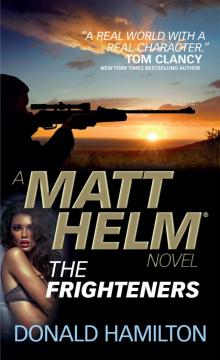 The Frighteners
The Frighteners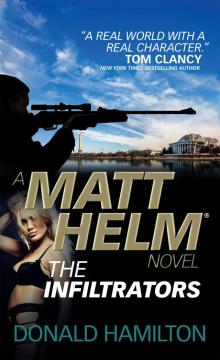 The Infiltrators
The Infiltrators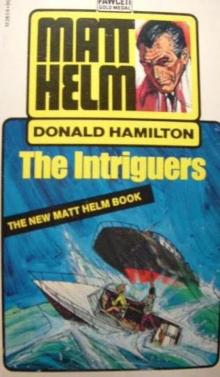 The Intriguers mh-14
The Intriguers mh-14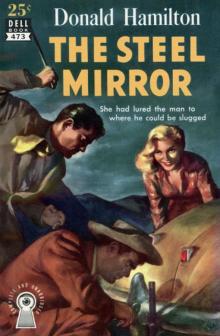 The Steel Mirror
The Steel Mirror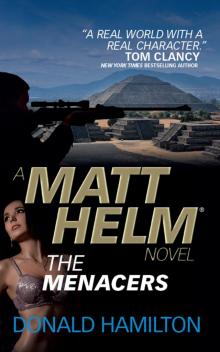 The Menacers
The Menacers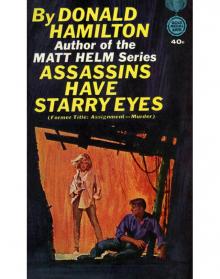 Assassins Have Starry Eyes
Assassins Have Starry Eyes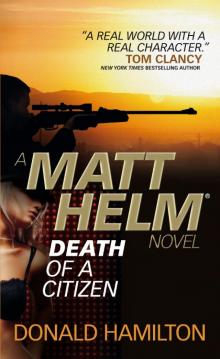 Death of a Citizen
Death of a Citizen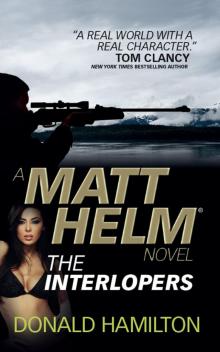 Matt Helm--The Interlopers
Matt Helm--The Interlopers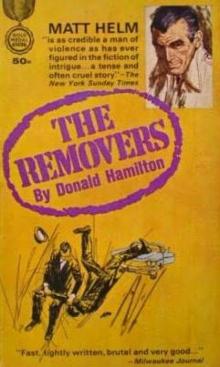 The Removers mh-3
The Removers mh-3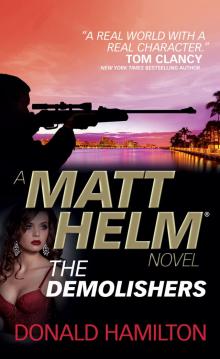 The Demolishers
The Demolishers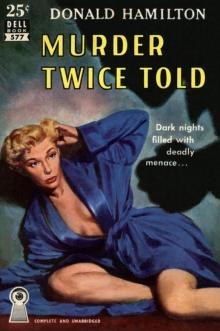 Murder Twice Told
Murder Twice Told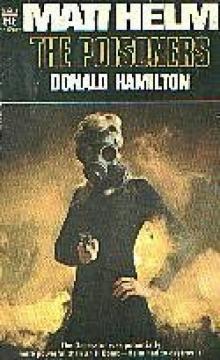 The Poisoners mh-13
The Poisoners mh-13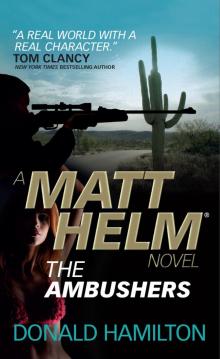 The Ambushers
The Ambushers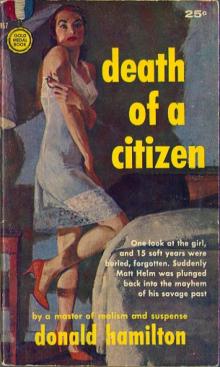 Death of a Citizen mh-1
Death of a Citizen mh-1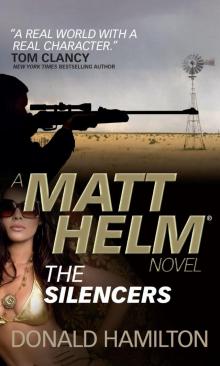 The Silencers
The Silencers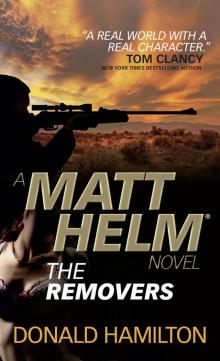 The Removers
The Removers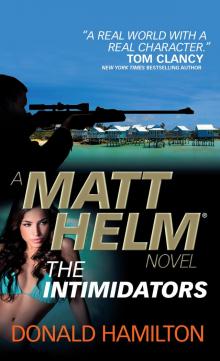 The Intimidators
The Intimidators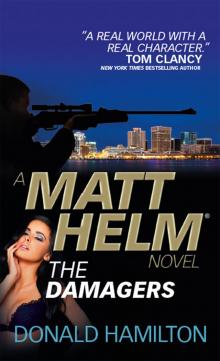 The Damagers
The Damagers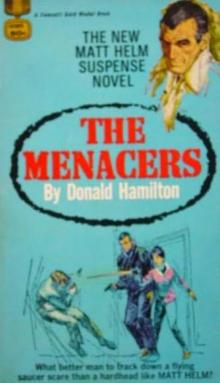 The Menacers mh-11
The Menacers mh-11 The Retaliators
The Retaliators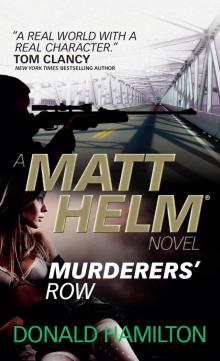 Murderers' Row
Murderers' Row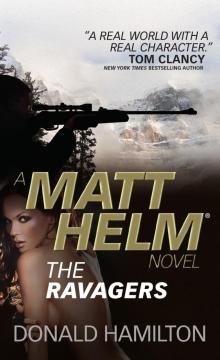 The Ravagers
The Ravagers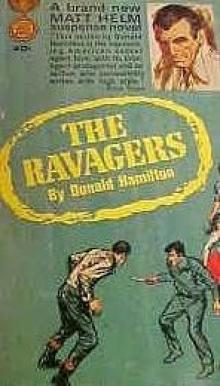 The Ravagers mh-8
The Ravagers mh-8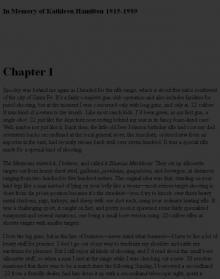 The Threateners
The Threateners The Betrayers mh-10
The Betrayers mh-10